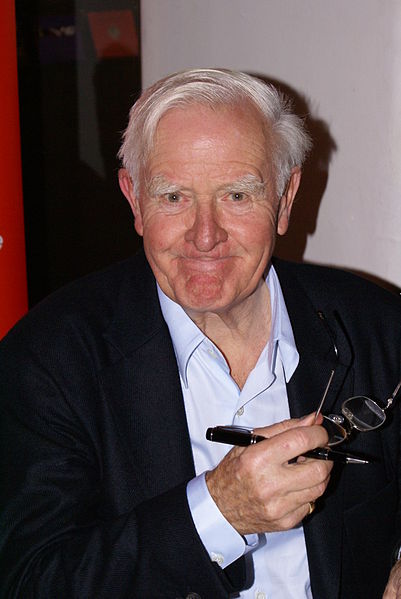From Jacobin
I first read John le Carré, who died Saturday at the age of eighty-nine, in graduate school for Russian studies. In my second year, I took an immense interest in espionage and intelligence history, culminating in taking a course on Cold War espionage, for which I evaluated his novel The Spy Who Came in From the Cold. It’s an incredibly intricate, tightly plotted book, and the paper was easy to write. Le Carré’s work affected me in a way that most of my readings on statecraft didn’t. He never indulged in the black-and-white reasoning of most foreign policy analysis, instead recognizing the humanity (and inhumanity) of all people involved — a recognition that cast a cynical eye on the brutality of American and British Cold War methods at a time when few Western authors would.
I fell in love instantly and have read most of his other works — though it’s an ongoing journey, since I kept pacing myself, spacing the books out to prevent myself from finishing his oeuvre too quickly. I loved entering the secretive world of spycraft that Le Carré created in his literature and didn’t want to exit it any sooner than was absolutely necessary.
The Spy Who Came in From the Cold may be his finest work, but other famous Le Carré greats include Tinker, Tailor, Soldier, Spy and The Tailor of Panama. All of his work explored themes of fidelity, pragmatism, and what service to — and disillusionment from — an ideal means.
Le Carré was obsessed with the idea of fidelity, and he explored it through both a personal and professional lens. His most famous character, George Smiley, is embarrassingly, publicly humiliated repeatedly by his socialite wife, Ann Sercombe, as she engages in high-profile affairs. Yet he maintains his singular, lonely devotion to his marriage (to a certain point). Many of Le Carré’s characters struggle with issues of infidelity, whether through experiencing it or committing it.
Le Carré depicted lonely protagonists maintaining their dedication to their ideals in the face of overwhelming systemic pressure to abandon them, against the plethora of characters who justified their own abandonment of those ideals. All of this took place in the political context of the Cold War, in which wrestling with that kind of moral ambiguity was treated as suspect, even potentially treasonous.
Intelligence historians and scholars of espionage often use the acronym MICE to discuss the motivations for sources: Money, Ideology, Compromise, and Ego. But Le Carré understood from his own experience working for British intelligence that the line between source and handler, or between subject and object, as well as what drives people, are never as clear as they seem. What he wrote about was depicted elsewhere as morally cut and dry, but Le Carré had walked in this world as an insider, and he knew that the black hat–white hat distinction wasn’t accurate. To say this was to buck the Western consensus that demanded absolute fealty and endless praise for Western security states.

Numerous Smiley novels end with Smiley playing an integral role in someone’s death, whether to avoid exposure, to end a threat, or even to prevent embarrassment to the greater cause of the Circus’s operations. The series ends with the choices Smiley makes in the service of British intelligence destroying his sense of self, an important departure from genre conventions of the triumphant and debonair intelligence agent.
In The Spy Who Came in From the Cold, pretended British defector Alec Leamas has a lengthy conversation about ideals versus operative needs with his East German counterpart, Fiedler. Fiedler brushes aside Leamas’s protests that Western intelligence is somehow more noble or moral than that of East Germany, saying, “All our work — yours and mine — is rooted in the theory that the whole is more important than the individual.”
This creates a deliberate echo with something the enigmatic spymaster Control says at the beginning of the novel: that “our methods — ours and those of the opposition — have become much the same. I mean, you can’t be less ruthless than the opposition simply because your government’s policy is benevolent, can you now?”
The idea that Western intelligence and East German intelligence committed similar acts for similarly nebulous goals as a matter of policy was a bold assertion at the time — one that cut deeply against how the CIA and MI6 would have preferred to be depicted. In a milieu where intelligence work was seen as dashing and readers were titillated by Ian Fleming’s James Bond novels, Le Carré instead offered them George Smiley: short, plump, betrayed, and characterized through his clockwork machinations rather than rugged flair. Instead of unambiguously fighting on the side of good against evil all the time, Smiley ruined lives and led innocent people to their deaths for British intelligence.
British audiences also had the recent example of Kim Philby and what we now know to be “the Cambridge Five”: a group of Cambridge-educated men who became instrumental Soviet agents in Britain. The Cold War was in full swing, and Le Carré was already sick of the rationale spies all over the world used for moral misdeeds and bored by his own work. Many of the details of these misdeeds are only recently coming to light, and they are appalling: the 1954 US-backed coup in Guatemala, the Phoenix assassination program in Vietnam, and other atrocities committed in the name of fighting communism.
He believed that Control’s justification of amoral action was coming from “the same man,” who, as he wrote in a foreword to The Spy Who Came in From the Cold fifty years later:
can be heard explaining away the catastrophic illegal war in Iraq, or justifying medieval torture techniques as the preferred means of interrogation in the twenty-first century, or defending the inalienable right of closet psychopaths to bear semiautomatic weapons and the use of unmanned drones as a risk-free method of assassinating one’s perceived enemies and anyone who happens to be standing near them. Or a loyal servant of his corporation, assuring us that smoking is harmless to the health of the Third World and great banks are there to serve the public.
Le Carré’s work broke from Cold War orthodoxy about good versus evil and threw out the popular Manichaean worldview that characterized so much fiction about the time period. It captivated readers because it respected them: instead of delivering pabulum about the Reds or noble Western heroes, Le Carré’s characters were broken and melancholy men who failed more often than not. When they won, it was at great personal cost. It arrested the Cold War spell over cultural productions through sheer effrontery.
A friend recently told me that they admired Le Carré for being bold enough to have the hero take “a dirt nap” at the end of one of his books. This departure from genre conventions of the triumphant, exultant hero was because, after his years of service in intelligence, Le Carré came away thoroughly sick of intelligence work and didn’t feel compelled to make everything work out in the end — didn’t feel like the character and the world of Cold War espionage that he inhabited deserved it. He was thoroughly disillusioned and referred to The Spy Who Came in From the Cold as “the work of a wayward imagination brought to the end of its tether by political disgust and personal confusion.” Throughout his career, his novels served as both personal catharsis and a political statement.

Despite this sentiment, Le Carré was not strongly involved in politics after his searing condemnation of the Iraq War. Last year, Le Carré signed a letter condemning Jeremy Corbyn. While disappointing, it was to be expected from someone who had described their politics as “compassionate conservatism”: while there are many reasons why Le Carré’s work is informative and instructive for leftists, it’s not for his contemporary political stances.
What makes Le Carré’s work timeless and, most important, critical for its time, is that he eschewed the espionage genre conventions of inscrutable Asians, wily Slavs, and intractable enemies of Western liberalism for a view of the world that granted equality to all. Le Carré’s characters ranged from con men to secretaries to schoolteachers to secret agents to bartenders. They were everyone in the world and no one, all brought together to paint a richly detailed and human picture of the Cold War and its brutal consequences.
His close-up experience with the way in which the Cold War was fought repulsed him in its departure from its stated ideals and values. Despite his political sympathies for his government, he felt compelled to condemn its abuses against the people it claimed to protect and commit extraordinary acts for the alleged protection of. His work lacked the glamor and ritz of spy fiction and instead portrayed it as a dreary, disturbing machine that ground up innocents for a goal that didn’t justify the human cost. The fact that he was a former intelligence officer lent him authority on the subject and made him a powerful advocate demanding accountability for the West during the Cold War — at a time when few such advocates could be found.
Leave a Reply
You must be logged in to post a comment.